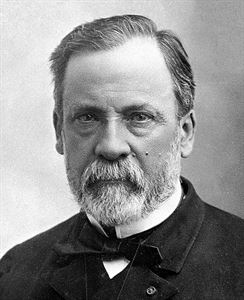Louis Pasteur

Louis Pasteur (December 27, 1822-September 28, 1895) was a French microbiologist, chemist, lecturer, and writer. Regarded as the "Father of Microbiology," he is famous for his work in germ theory, discovering the molecular basis for the asymmetry in certain crystals, and his creation of vaccinations for diseases such as anthrax, cholera, smallpox, turbuculosis, and rabies. His discovery of treating milk and wine with a process of heating and cooling to stop bacterial contamination saved countless lives and known today as pasteurization. Pasteur's international fame was instant and in 1888 he established the Pasteur Institute in Paris. It remains one of the leading private foundations dedicated to the study of biology and micro-organisms. It is responsible for some of the greatest breakthroughs in modern medicine. Since 1891, the Pasteur Institute had been extended worldwide, and today, there are 32 institutes in 29 countries.